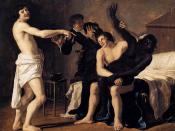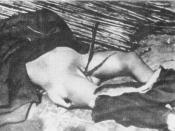"Rape & Race in the Nineteenth Century South", focuses on the relationship between race and class in the south during the antebellum and post antebellum historic periods. The book offers a different perspective on the emergence and popularity of the rape myth. Through a variety of historical accounts, Sommerville shows that placing the rape myth in a post antebellum historical context will help readers transcend the racial stereotypes that we have come to accept, and at the same time highlight the hypocrisy of the social world in the south whose responses to rape were solely based on the victim's class and race, not necessarily evidence or credibility.
The tragedy at hand was the finger pointing that was placed on innocent people when white women falsely claimed to be raped by black men. However, this was not as prevalent an issue as we have commonly been taught. In actually, rape accusations of black men became more popular after, not before the civil war, because he was more vulnerable to false accusations as a free man.
A free black man accused of rape indeed would have a lynch mob after his head where on the other hand, being a slave offered him a certain amount of protection from his master. Still, the master's only incentive for protecting his slave would be reducing the risk of loosing an investment. Humans were reduced to property in the antebellum south. Worse off than the black male slaves were the black female slaves, who were literally turned into breeders. Consider the gradual abolition bills that made it obvious that the country was in no rush to give blacks their freedom. In fact, a bill passed in 1779 claimed that children born of a slave even one day before the passing of the bill, would remain...


